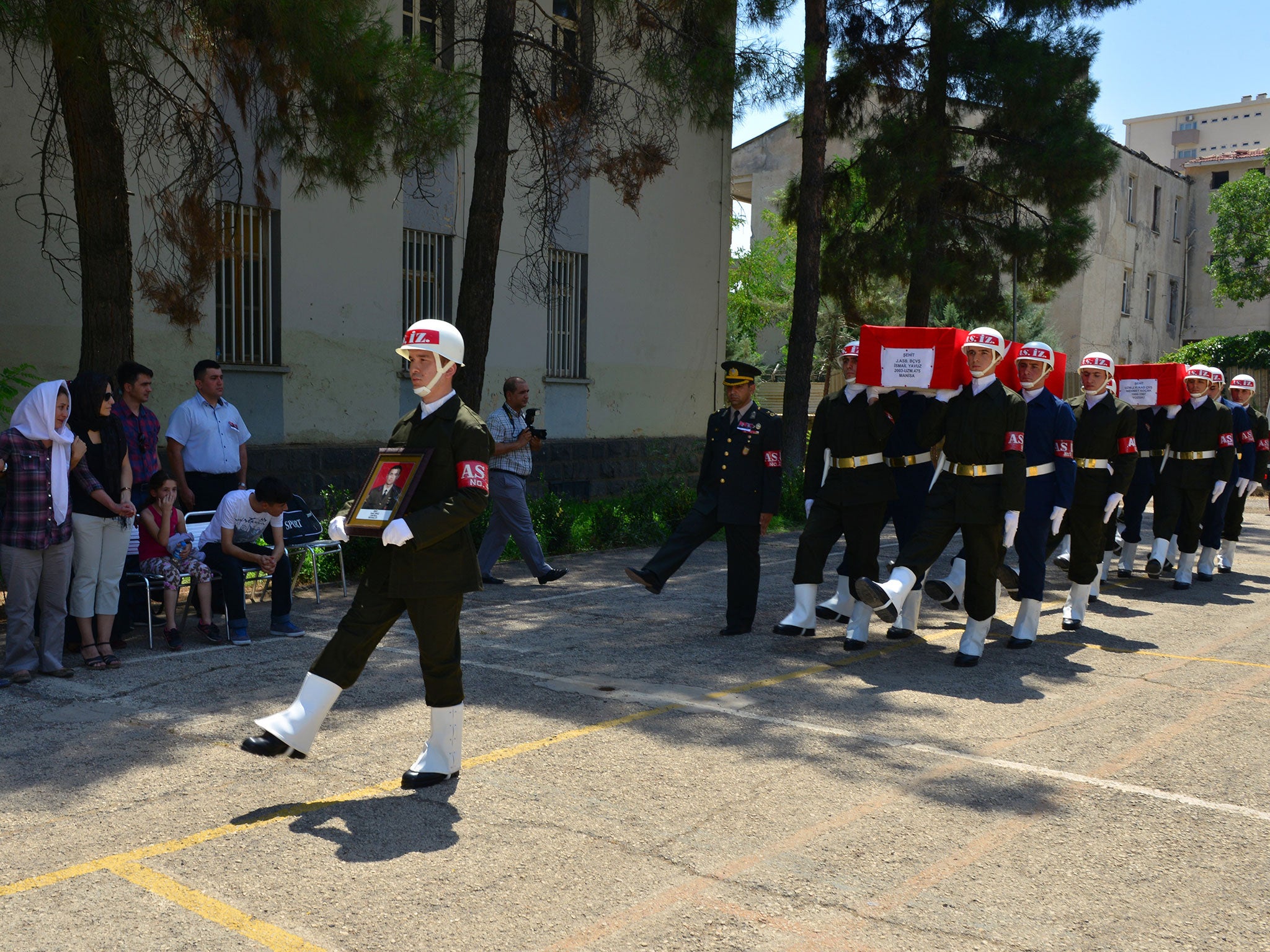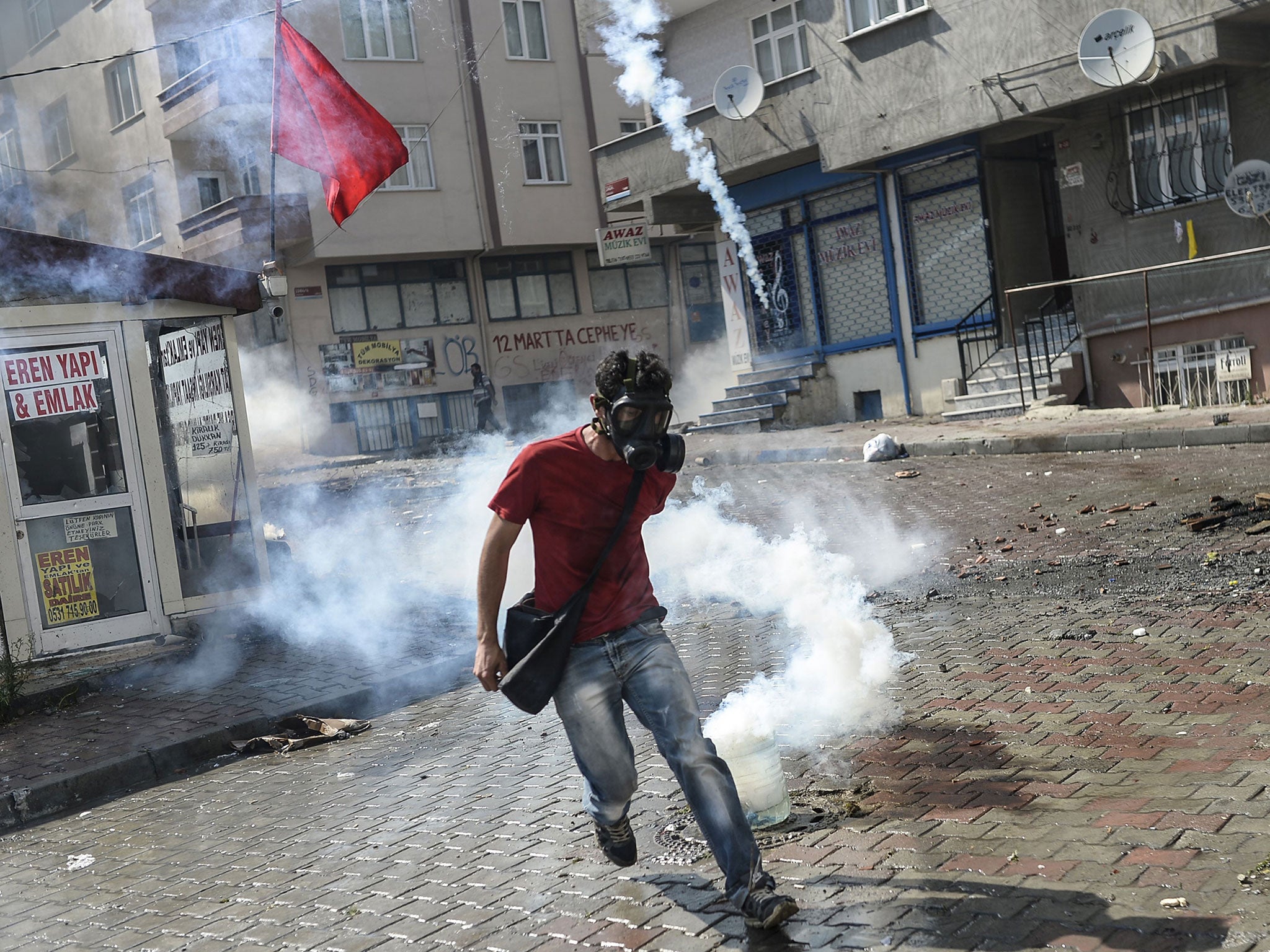Turkey conflict with Kurds: Was approving air strikes against the PKK America's worst error in the Middle East since the Iraq War?
Turkish air attacks on the PKK have provoked bloody Kurdish retaliation. With claims that America approved the strikes that restarted the conflict, Patrick Cockburn argues that the US may have made its worst mistake since invading Iraq

Your support helps us to tell the story
From reproductive rights to climate change to Big Tech, The Independent is on the ground when the story is developing. Whether it's investigating the financials of Elon Musk's pro-Trump PAC or producing our latest documentary, 'The A Word', which shines a light on the American women fighting for reproductive rights, we know how important it is to parse out the facts from the messaging.
At such a critical moment in US history, we need reporters on the ground. Your donation allows us to keep sending journalists to speak to both sides of the story.
The Independent is trusted by Americans across the entire political spectrum. And unlike many other quality news outlets, we choose not to lock Americans out of our reporting and analysis with paywalls. We believe quality journalism should be available to everyone, paid for by those who can afford it.
Your support makes all the difference.Kurdish guerrillas have killed two Turkish soldiers in an ambush in south-east Turkey as fighting resumes between Turkish security forces and Kurdish militants, ending a two-year-old ceasefire. The attack came after Turkish aircraft heavily bombed bases of the Kurdistan Workers Party (PKK) in the Qandil Mountains in northern Iraq.
In a sign that the PKK has resumed military operations against the government, a Turkish army vehicle on a road near Diyarbakir, the largest Kurdish city, was hit by bomb blasts followed by rifle fire, according to the army. A further four soldiers were wounded in the attack.
The attack came in response to a heavy air raid by Turkish aircraft on PKK bases in the Qandil Mountains in northern Iraq on Saturday – ostensibly part of a new Turkish offensive against terrorist groups, said also to be aimed at Isis.
But it came as the US was accused by Kurds of tolerating a renewed Turkish government assault on its Kurdish minority as the price for permission for US aircraft to use Turkey’s Incirlik air base against Isis jihadists for the first time.
“The Americans are not very clever in calculating this sort of thing,” said Kamran Karadaghi, an Iraqi Kurdish commentator and former chief of staff to the Iraqi President, Jalal Talabani. “Maybe they calculate that with Turkey involved on their side, they don’t need the Kurds.”
The US denies giving the go-ahead for Turkish attacks on the PKK in return for American use of Turkish air bases, or of any link with Turkish action against Isis fighters and volunteers, who were previously able to move fairly freely across Turkey’s 550-mile border with Syria.

But whatever America was hoping for, initial signs are that the Turkish government may be more interested in moving against the Kurds in Turkey, Syria and Iraq than it is in attacking Isis. Ankara has previously said that it considers both the PKK and Isis to be “terrorists”.
Meanwhile, Turkish police have stepped up suppression of all types of dissent – using water cannon against everybody from activists to members of the heterodox Shia Alevi sect, who number several million and claim they are discriminated against. Over the weekend, 1,000 people who demonstrated in Ankara for peace were detained, their wrists held together by what were said to be especially tight and painful plastic handcuffs.
The result is that the US may find it has helped to destabilise Turkey by involving it in the war in both Iraq and Syria, yet without coming much closer to defeating Isis in either country. If so, America will have committed its biggest mistake in the Middle East since it invaded Iraq in 2003, believing it could overthrow Saddam Hussein and replace him with a pro-American government.
On Sunday night, the Turkish foreign ministry announced that it had called an extraordinary council meeting of Nato, of which Turkey is a member, on Tuesday to discuss its operations against both the PKK and Isis, “in view of the seriousness of the situation after the heinous terrorist attacks in recent days”. It said Turkey would inform allies of the measures it was taking following last week’s Isis suicide bombing near Turkey’s border with Syria that left 32 people dead, and an Isis attack on Turkish forces that killed a soldier.
The move to involve the alliance in discussion of the threat to Turkey came under Article 4 of Nato’s founding Washington Treaty, which allows countries whose security is threatened to consult with the other 27 members.
Turkey has become increasingly unstable and violent over the past two years as President Recep Tayiip Erdogan has tried to consolidate his grip on power, even as his AKP party lost its parliamentary majority in last month’s general election.
A possible interpretation of the Turkish government assault on Isis, PKK and other opposition groups is that Mr Erdogan intends to win the new election expected by many later this year if no governing coalition with other parties can be formed in the meantime. He would then try to win a majority on the back of a wave of anti-Kurdish and anti-terrorist nationalism, fuelled by revulsion against attacks by the PKK and Isis.
America’s problem is that its most effective ally against Isis in Syria so far has been the PYD, the ruling political party of the 2.2 million Syrian Kurds, who are concentrated in three enclaves just south of the Turkish border. The PYD and its paramilitary forces, known as the People’s Protection Units or YPG, are the Syrian branch of the PKK. Helped since last year by US air support, they have repelled Isis from its siege of the city of Kobani and have won a series of further victories against the jihadist group. including the capture of an important border crossing at Tal Abyad.
While allying itself with the Kurds in Syria, the US denounces their mother organisation, the PKK, as “terrorists”. The White House spokesman, Ben Rhodes, said: “The US, of course, recognises the PKK specifically as a terrorist organisation. And, so, again Turkey has a right to take action related to terrorist targets.”
He did not add that the US had been supplying Turkish intelligence with information about PKK bases in Iraq since 2007.
This is a peculiarly Machiavellian form of realpolitik since members of the YPG often gained military experience fighting in the PKK against the Turks, explaining why they have had more success against Isis than other groups. In fact, Isis may benefit from the US switch in alliances because some PYD fighters in Syria will now return to fighting the Turkish army.
Omar Sheikhmous, a veteran Syrian Kurdish leader living abroad, believes that when it comes to the fight against Isis, “on balance the involvement of Turkey may be more important than that of the Kurds for the Americans”.
But how far Turkey will really engage against Isis in Syria is unclear. It says it wants to declare a buffer zone, cleared of Isis fighters, west of Kobani, but at the same time the Deputy Prime Minister, Bulent Arinc, said at the weekend that Turkey was “not thinking” of committing ground troops.
Turkey is arresting Isis activists, many of whom, Turkish opposition parties note, were previously living untroubled by the Turkish security forces. Halis Bayancuk, the reputed Isis leader in Turkey, has been arrested just as he was a year ago – on which occasion he was soon released, and the police who detained him sent to prison instead. The shift by America towards Turkey and against the Kurds may have further ramifications for the balance of power in the region.
The US will undoubtedly be able to strengthen its air offensive against Isis, enabled to keep more planes in the skies above the self-declared caliphate because the Incirlik base is only 60 miles from the Syrian border. On the other hand, about 400 US air strikes were unable to prevent Isis capturing Ramadi, the capital of Anbar province, on 17 May.
There may be other repercussions from the new Turkish-American alignment. One reason for the Turkish action was that Ankara did not like the way the Syrian Kurds were becoming a favourite US ally. They were also concerned that the US-Iran nuclear deal with Iran risked making Tehran more important than Ankara in Washington’s calculations.
It is likely that America will tolerate Turkish action against the PKK in Qanduk and Turkey but block any Turkish army moves to push into the Kurdish enclave in north-east Syria. But the PKK may, meanwhile, seek support from Iran and from the Syrian government in Damascus, with which it formerly had close relations.
Join our commenting forum
Join thought-provoking conversations, follow other Independent readers and see their replies
Comments